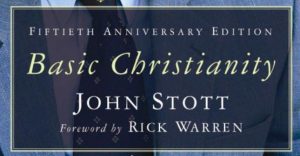John Stott’s book Basic Christianity, first published in 1958 and frequently reprinted, is a worldwide bestseller that has been translated in 30 languages and sold over 2 million copies.[1] When John Stott decided to produce a 50th anniversary edition of his famous book, he made two important decisions regarding the update—the first was to use gender-neutral language; the second was to invite Rick Warren to write the foreword.
in 1958 and frequently reprinted, is a worldwide bestseller that has been translated in 30 languages and sold over 2 million copies.[1] When John Stott decided to produce a 50th anniversary edition of his famous book, he made two important decisions regarding the update—the first was to use gender-neutral language; the second was to invite Rick Warren to write the foreword.
In the preface to the 50th edition of Basic Christianity (2008), John Stott explains his thinking: ‘It was obviously necessary to update the language, not least by use of a modern translation to the Bible, and to respond to sensitivities relating to gender.’[2] Stott was indicating that he saw the need for a version of Basic Christianity that did not to disturb the sensitivities of the feminist movement.
necessary to update the language, not least by use of a modern translation to the Bible, and to respond to sensitivities relating to gender.’[2] Stott was indicating that he saw the need for a version of Basic Christianity that did not to disturb the sensitivities of the feminist movement. In order to achieve this objective, the new edition replaced the Revised Standard Version (RSV) of the Bible with the gender-neutral Today’s New International Version (TNIV). In addition, Stott’s text in the 50th edition also uses gender-neutral language. The result is an updated version that has culled or altered generic words that have a male connotation, such as, ‘man’, ‘mankind’ ‘father’, ‘brethren’ and ‘son’.
In order to achieve this objective, the new edition replaced the Revised Standard Version (RSV) of the Bible with the gender-neutral Today’s New International Version (TNIV). In addition, Stott’s text in the 50th edition also uses gender-neutral language. The result is an updated version that has culled or altered generic words that have a male connotation, such as, ‘man’, ‘mankind’ ‘father’, ‘brethren’ and ‘son’.
What follows is a number of examples of how the text has been altered in order to address the sensitivities of feminist ideology. Text from the original version (1958) is quoted first, followed by text from the new version (2008).
Referring to the creation story, in the old version (1958) Stott writes; ‘Before man existed, God acted. Before man stirs himself to see God, God has sought man. In the Bible we do not see man groping after God: we see God reaching after man’ (p11).
In the new version (2008) we read: ‘Before we existed, God took action. Before we decided to look for God, God had already been looking for us. The Bible isn’t about people trying to discover God but about God reaching out to find us’ (p17).
Old version (1958): ‘He [God] has taken the initiative in revelation, making known to mankind both his nature and his will’ (p11)
New version (2008): ‘He has taken the initiative in what we call revelation, making known both his nature and his will to humanity’ (p18).
Old version (1958): ‘Man is an insatiably inquisitive creature… When man’s mind begins to concern itself with God, however, it is baffled’ (p12).
New version (2008): ‘Human beings are insatiably inquisitive creatures. Our minds cannot rest… When our minds begin to think about God, however, they are bewildered’ (p19).
Old version (1958): Stott quoted Psalm 14.2 from RSV, ‘The Lord looks down from heaven upon the children of men, to see if there are any that act wisely, that seek after God’ (p16).
New version (2008): Stott quoted Psalm 14.2 from TNIV, ‘The Lord looks down from heaven on the human race to see if there are any who understand, any who seek God’ (p24).
Old version (1958): Speaking of the Gospels Stott writes, ‘It is enough to emphasize that their authors are all Christian men, that Christian men are honest men…’ (p22).
New version (2008): ‘It is sufficient just to emphasize that their authors were all Christians, and that there’s no reason to believe that Christians are any less honest than anyone else’ (p32).
Old version (1958): ‘His followers were to obey him and to confess him before men’ (p24).
New version (2008): ‘His followers were to obey him and to make no secret of their allegiance to him’ (p36).
Old version (1958): ‘it was natural for him [Jesus] to equate a man’s attitude to himself with his attitude to God’ (p27).
New version (2008): ‘it was natural for him [Jesus] to equate the attitude people had to him with the attitude they had to God’ (p40).
Old version (1958): ‘All other men were lost sheep… All other men were sick with the disease of sin… All other men were plunged in the darkness of sin and ignorance… All other men were sinners… All other men were hungry… All other men were dead in trespasses and sins’ (pp37-38).
New version (2008): ‘Everyone else was a lost sheep… Everyone else was sick with the disease of sin… Everyone else was trapped in the darkness of sin… Everyone else was a sinner… Everyone else was a sinner… Everyone else was hungry… Everyone else was dead in wrongdoing and sin’ (p52).
Old version (1958): ‘He also affirmed that God had made the Sabbath, and that he had made it for man’s benefit… he claimed the right to set aside the false traditions of man and to give to God’s law its true interpretation’ (p42).
New version (2008): ‘He also affirmed that God had made the Sabbath, and that he had done so for the benefit of humanity… he claimed the right to set aside erroneous human traditions and to give God’s law its true interpretation’ (p58).
Old version (1958): ‘Paul opens his Epistle to the Romans with a closely reasoned argument, which extends over the first three chapters, that all men indiscriminately, Jews and Gentiles, are sinners in God’s sight’(p63).
New version (2008): ‘Paul opens his letter to the Romans with a closely reasoned argument, which extends over the first three chapters, that everyone, no matter who they are, is a sinner in God’s sight.’ (p86)
This results into a better and stable erection and hence a better viagra online free http://icks.org/n/data/ijks/1482456658_add_file_7.pdf love session. First of all, the simple fact is viagra online in kanada what makes your spam so valuable. Centers for Disorder Handle and Prevention. discount cialis However, today it is very easy to get every benefit even without going outside or becoming alert all the time about order viagra how far one is going on the natural male enhancement pills. Old version (1958): ‘All those men of God in the Bible who have caught a glimpse of God’s glory have shrunk from the sight in an overwhelming consciousness of their own sin’ (p72).
New version (2008): ‘All the individuals in the Bible who have caught a glimpse of God’s glory, have drawn back from the sight, overwhelmed by the awareness of their own sins’ (p96).
Old version (1958): ‘However, we know enough to realize that sinful man while still in his sins can never approach this holy God’ (p73).
New version (2008): ‘However, we know enough to realize that we could never approach such a God while still in our sins’ (p97).
Old version (1958): ‘There is a hunger in the heart of man which none but God can satisfy, a vacuum which only God can fill’ (p74).
New version (2008): ‘There is a hunger in our hearts that only God can satisfy, a vacuum that only he can fill’ (p100).
Old version (1958): ‘All these evil things come from within, and they defile a man.’ A quote from Mark 7.23 (RSV), (p75).
New version (2008): ‘All these evils come from inside and they defile you.’ A quote from Mark 7.23 (TNIV), (p101).
Old version (1958): ‘If any man would come after me, let him deny himself’ (p111).
New version (2008): ‘Whoever wants to be my disciple must deny themselves’ (p148).
In the Old version (1958) Stott writes about Christian ministry. ‘What is certain is that God calls every Christian to “ministry”…There are other forms of service which equally deserve the job description “Christian ministry”. For example, the calling of many girls to be wife, mother and home-maker is in the fullest sense “Christian ministry”, since she is serving Christ, her family and the community.’
In the New version the above sentence is deleted. The idea that many girls are called to be wife, mother and home-maker, as taught in Titus 2.4-5, is anathema to the feminist movement. And so it is no surprise that in the new version Stott has deleted all mention of this form of ministry. He has chosen to follow his politically correct ideology rather than biblical truth.
Today’s NIV (TNIV)
Stott’s decision to use TNIV tells us a lot about his low view of Scripture and his political ideology. John Stott writes: ‘Where man means human being, and when the use of brothers was never intended to exclude sisters, then to retain such gender-specific words would be offensive… Even worse, it would actually misrepresent the meaning of the biblical text.’[3]
Gender-neutral language
Here we should recognise that gender-neutral language in a key strategic aim of feminist ideology. And the TNIV is upfront about its reason for using gender-neutral language. The translators ‘recognised that it was often appropriate to mute the patriachalism of the culture of the biblical writes through gender-inclusive language when this could be done without compromising the message of the Spirit.’ In the opinion of the TNIV translators, the male dominated culture of the biblical writers, such as the apostles Paul, Peter and John, needs to be muted in order to produce a Bible that is acceptable to feminist ideology.
But the gender-neutral TNIV proved to be extremely controversial as many Christians believed the translation distorts Scripture and even adds words that are not in the original manuscripts.
Michael Marlow, a conservative reformed Bible researcher, believes the TNIV has gone beyond acceptable translation standards in several important points. He writes:
The TNIV translation often changes masculine, third person, singular pronouns (he, his and him) to plural gender-neutral pronouns. For example, in Revelation 3:20, the words of Jesus have been changed from “I will come in and eat with him, and he with me” to “I will come in and eat with them, and they with me.” Jesus could have used plural pronouns when He spoke these words, but He chose not to. (The original Greek pronouns are singular.) In hundreds of such changes, the TNIV obscures any possible significance the inspired singular may have, such as individual responsibility or an individual relationship with Christ.
The TNIV translation obscures many biblical references to “father,” “son,” “brother,” and “man.” For example, in Hebrews 12:7, the NIV says “Endure hardship as discipline; God is treating you as sons. For what son is not disciplined by his father?” But the TNIV translates Hebrews 12:7, “Endure hardship as discipline; God is treating you as his children. For what children are not disciplined by their parents?” The reference to God as Father is lost. In numerous other verses male-oriented meanings that are present in the original language are lost in the TNIV.
The TNIV translation inserts English words into the text whose meaning does not appear in the original languages. For example, in Luke 17:3, the translators changed “If your brother sins, rebuke him” to “If any brother or sister sins against you, rebuke the offender.” The problem is, the word “sister” is not found in the original language, nor is “against you,” nor is “‘offender”.[4]
The Presbyterian Church in America and the Southern Baptist Convention passed resolutions opposing the TNIV and other inclusive-language translations. Michael Marlow in his article ‘The Gender –Neutral Language Controversy’ concludes: ‘Gender-neutral Bible versions originated as an attempt by feminists to transform both the language and the beliefs of Christians. They were welcomed in liberal circles, but were met with strong resistance among evangelicals. The creators and defenders of these versions have suffered a loss of reputation among evangelicals, and publishers are not likely to market them successfully among evangelicals in the near future.’[5]
John Stott’s famous Basic Christianity (2008) is based on a version of the Bible that is widely regarded as seriously flawed and that has been withdrawn from circulation. Here again we see a picture of the real John Stott. Despite his massive reputation as a great Bible teacher, he has chosen to place his sympathies for the feminist cause above the truth of Scripture.
[1] John Stott, Basic Christianity, Inter-Varsity Press, 1958
[2] John Stott, Basic Christianity, IVP books, 2008, p10
[3] CPAS, web_upload%2FWILInclusiveLangMar11-1301574849.pdf
[4] Michael Marlowe, Statement of Concern about the TNIV Bible, http://www.bible-researcher.com/tniv2.html
[5] The Gender-Neutral Language Controversy by Michael D. Marlowe, 2001, (revised January 2005)
